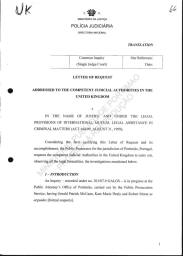The Process Involved in Filing Letters Rogatory: A Step-by-Step Overview
The Process Involved in Filing Letters Rogatory: A Step-by-Step Overview
Blog Article
The Role of Letters Rogatory in International Legislation: Trick Insights
Letters rogatory work as a pivotal instrument in international law, facilitating cross-border lawful assistance by permitting jurisdictions to officially ask for evidence and activities from each other. Rooted in historic precedents and defined with arrangements like the 1970 Hague Convention, these requests are vital for promoting global teamwork. Their application often runs into substantial difficulties, consisting of disparities in lawful criteria and procedural hold-ups, which can impede their efficiency. Recognizing the nuances of this procedure raises critical inquiries regarding worldwide partnership and the potential reforms needed to boost its integrity. What implications might these difficulties have for future lawful proceedings?
Interpretation of Letters Rogatory
In the realm of global regulation, letters rogatory act as official requests released by a court in one jurisdiction to seek assistance from a court in an additional territory. Letters rogatory. These demands are particularly considerable in cross-border lawful proceedings, where the enforcement of a court's order or the celebration of evidence may be hindered due to administrative limitations

The process normally needs the asking for court to express the certain information or activity required from the foreign court, adhering to the legal procedures and conventions established between the territories involved. As soon as issued, the letters rogatory are sent with diplomatic networks, which might consist of embassies or consular offices, to guarantee that the demand is acknowledged and acted on by the international court. Overall, letters rogatory exhibit the cooperative structure important for reliable worldwide lawful processes.
Historical Context
Although the technique of letters rogatory has old roots, its formalization within the structure of worldwide regulation emerged substantially in the 20th century. Historically, such ask for judicial aid were used in different legal practices, including Roman legislation, where they promoted cross-border collaboration in legal matters. The concept obtained restored interest with the rise of globalization and the boosting intricacy of global lawful communications.
The mid-20th century saw the establishment of treaties and conventions that sought to standardize the process of letters rogatory. Especially, the 1970 Hague Convention on the Taking of Evidence Abroad in Business or civil Matters offered a structured method, improving the efficacy of these demands - Letters rogatory. This duration noted a change from casual setups to a much more organized framework, which addressed the difficulties positioned by differing national legal systems
As states ended up being more interdependent, the demand for reliable mechanisms to gather proof throughout boundaries emerged, enhancing the role of letters rogatory in assisting in worldwide collaboration. Today, they continue to be a crucial tool for obtaining evidence and guaranteeing that justice transcends nationwide limits, reflecting the developing nature of global regulation in response to worldwide difficulties.
Process of Issuing Demands
The process of providing letters rogatory typically involves numerous essential actions designed to guarantee that ask for judicial assistance are clear, details, and certified with both residential and global lawful criteria. A celebration looking for help must prepare a formal request that lays out the important facts of the case, the relief looked for, and the particular evidence or testimony called for. This file needs to be crafted with precision to meet the lawful needs of the territory in which it will be sent.
Complying with the prep work of the request, it is sent to the appropriate authority, often a court or an assigned governmental company. This authority assesses the request to guarantee it adheres to step-by-step norms and lawful standards. When authorized, the demand is sent to the foreign territory through diplomatic networks.
Upon invoice, the foreign court assesses the demand's compliance with its regional regulations and methods (Letters rogatory). If approved, it proceeds to carry out the demand, which may include the issuance of subpoenas or the collection of proof. Throughout this procedure, keeping clear communication between the requesting and receiving territories is crucial to guarantee effective cooperation and the gratification of the demand
Obstacles and Limitations
Challenges and limitations frequently develop in the procedure of performing letters rogatory, usually stemming from varying legal systems and treatments in between territories. One significant obstacle is the varying criteria of admissibility for evidence, which can cause issues in the approval of documents requested via letters rogatory. In addition, the absence of uniformity in lawful terminology and definitions can develop misconceptions, making complex communication between courts in various nations.
Additionally, hold-ups prevail as a result of administrative procedures, as the demand may require to pass with numerous layers of lawful authorities prior to it is fulfilled. In some circumstances, the asked for jurisdiction may lack the required sources or determination to coordinate, even more preventing the procedure. Language obstacles also contribute to challenges, as accurate translation of lawful documents is critical for making sure that the designated message is communicated without distortion.
Finally, sovereignty problems may occur, as some states Recommended Site hesitate to follow demands that they view as infringing upon their lawful freedom. These challenges highlight the intricacies inherent in making use of letters rogatory, demanding higher harmonization and cooperation among worldwide lawful systems to enhance their performance.

Influence On International Cooperation
Recognizing the relevance of letters rogatory in fostering global teamwork is crucial, as these requests facilitate cross-border lawful support and advertise joint initiatives in criminal and civil issues. discover this By allowing one jurisdiction to formally request assistance from another, letters rogatory develop an organized legal structure that boosts the effectiveness of international communication between judicial authorities.
Using letters rogatory assists to establish shared depend on and respect amongst countries, which is crucial in a significantly interconnected world. They serve as a device not only for collecting proof however additionally for making sure that lawful processes are promoted throughout borders. This is particularly vital in combating multinational criminal offense, where the inability to safeguard teamwork can threaten justice.
Furthermore, the dependence on letters rogatory can simplify complex lawful process, decreasing hold-ups and uncertainties in global investigations. The step-by-step safeguards intrinsic in this process add to the defense of private civil liberties while helping with collaboration among states. Inevitably, the influence of letters rogatory on worldwide teamwork highlights their function as essential devices in the promo of justice, cultivating a joint spirit that transcends legal systems and national boundaries.
Conclusion
To conclude, letters rogatory work as an important tool in international regulation, assisting in cross-border legal help and teamwork. Regardless of fundamental challenges such as varying bureaucratic hold-ups and lawful requirements, their standardized treatments promote count on among countries. The ongoing development of these systems is important for improving the efficiency of worldwide lawful procedures, ultimately cultivating more powerful partnership in both criminal and civil matters across territories. The relevance of clear communication in this context can not be overemphasized.
Letters rogatory offer as a see this site critical instrument in global regulation, promoting cross-border legal aid by enabling jurisdictions to formally ask for proof and activities from one an additional.The process generally calls for the asking for court to articulate the details details or activity required from the international court, sticking to the legal procedures and conventions developed between the jurisdictions entailed. Historically, such demands for judicial support were used in numerous lawful customs, consisting of Roman legislation, where they assisted in cross-border participation in lawful issues.The process of issuing letters rogatory typically includes numerous crucial actions made to guarantee that requests for judicial support are clear, specific, and certified with both international and domestic legal requirements.Furthermore, delays are usual due to administrative procedures, as the request may require to pass with multiple layers of lawful authorities prior to it is fulfilled.
Report this page